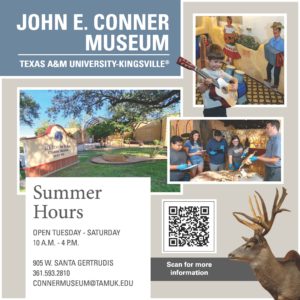Learning about yourself using theatre
Professor Corey W. Ranson, professor of theatre at Texas A&M University – Kingsville, has begun the Drama Think Project, an experience that helps students learn more about themselves using theatre.
The Drama Think Project began Sept. 6 with meetings in the Little Theatre.
“He briefly mentioned it and it was something he put up and he’s running with it. I’m kind of interested to see where it goes,” Art, Communication & Theatre (ACT) Department Chair Todd Lucas said.
It is operated like a traditional acting class and is meant to be flexible enough that the exercises and activities cater to those who come in. Using similar techniques from his advanced acting classes, Ranson has made Drama Think Project a deep dive into the psychological aspects of a student’s goals and sense of character, along with both breaking them out of their shells and analyzing their own behaviors.
At one of the meetings, he showed videos teaching the participants on how people tend to follow the majority, even if they have doubts on if the majority is right, in order to fit in. He also had participants complete an activity where they had to act out a standard conversation while other participants added in different scenarios to the scene. The point of the exercise was to get the actors to convey the scene that they were given without changing any of the dialogue, using only their voices and body language to tell the audience what is going on.
“It’s a good thing, that way we can start building up the theatre program again and get more students interested,” ACT Senior Administrator Coordinator I Patsy Rios said. “Because we’ve lost a lot of our theatre students, so we need to rebuild it again.”
Rios has hope that Ranson’s project could potentially bring more interest back into the theatre program.
“It’s good to have a theatre program because it gives the students something to go watch […],” Rios said. “It gives students experience to be active on stage, bring them out of their shyness and open up.”
Ranson compares the project to Drama Therapy.
“It’s kind of like roleplay. They work with people who are in incarceration and stuff like that. It probably falls more on the medical-kind of psychological side,” Ranson said.
However, he clarified that the Drama Think Project is not Drama Therapy.
“What we try to do is enhance what we call the ‘normally healthy individual,’” he continued. “It’s not saying ‘we’re going to come in here and fix you with this.’ This is saying ‘Let’s show you how to enhance what you already don’t realize that you do.’ Ours is on more of a fun discovery process as opposed to ‘Let’s use this to help fix you!’”
Lucas also had his own thoughts in regard to the Drama Think Projects discovery process as well as how it can be used to help students.
“If that’s one aspect of it, I would highly encourage it. Because I mean, that’s how we continue to get the arts in general out to people. They can actually help a lot of different people in a lot of different ways,” Lucas said. “And then as they also perform and do these tasks, however you want to approach it, they also develop an appreciation for it…and then that helps more people understand what’s going on and how it evolves and how it builds.”
“The goal for this would be: If I had a student come back to me and say, ‘I had a much better semester, I was able to think more clearheaded, I was able to clarify what I think I wanted to do.’ I mean, that right there is a win,” Ranson said. “Personally, I’m not doing it for any other reason other than to see how applying a basic process of character study from an actor’s perspective works on a non-theatre student and how that applies to their real living life.”
Though turnout for the Drama Think Project has been small, the project is not about how many people show up. Rather, it is about what those who do show up do during the one hour of time that they have at the Little Theatre.

